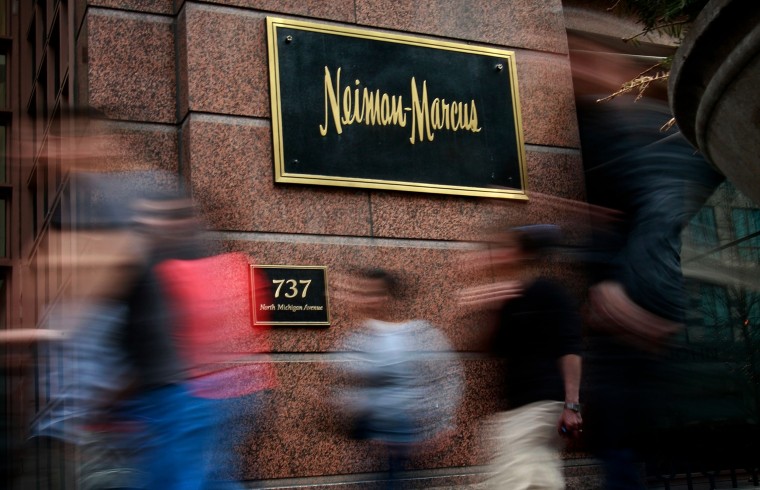The department store, once a proud symbol of American excess and upward mobility, threatens to descend into obscurity as a result of the coronavirus, with Neiman Marcus, JCPenney and Lord & Taylor all reported to be exploring bankruptcy.
Neiman Marcus, which also operates two Bergdorf Goodman stores in New York City and 22 Last Call discount locations, had been in distress well before the coronavirus halted nonessential shopping. The company's sales and revenue have tumbled as competition increases from online startups and brick-and-mortar stores launched by brands previously sold mainly in department stores.
The company missed a key $5.7 million interest payment this month to pay down its$4.7 billion in debt. It reported a net loss of $31.2 million in July, compared with a net loss of $19.9 million the year before.
JCPenney was also facing trouble well before the pandemic forced the company to close its fleet of 850 stores. The company's shares are worth less than $1 as it has struggled to manage a crushing debt load of $3.7 billion.
Full coverage of the coronavirus outbreak
Lord & Taylor has also struggled to grow profits. Hudson's Bay Co. sold the department store to the subscription company Le Tote last year for $75 million. As part of the deal, Le Tote would take over the ailing department store's 38 locations, e-commerce site and inventory while Hudson's Bay pays rent for three years. The company reported a loss of $119 million in fiscal 2018, according to Bloomberg.
The economic impact of the coronavirus has sped up changes in retail, turning the industry into a land of stark winners and losers.
The pandemic "has created unprecedented challenges," a spokesperson for JCPenney told NBC News in a statement. The company "has been engaged in discussions with its lenders since mid-2019 to evaluate options to strengthen its balance sheet and maximize its financial flexibility, a process that has become even more important as our stores have also closed due to the pandemic," the company added.
Neiman Marcus and Lord & Taylor did not immediately respond to requests for comment.
Companies such as Neiman Marcus, loaded with debt in part because of its 2013 leveraged buyout by the private equity firm Ares Management and the Canada Pension Plan Investment Board, don't have the balance sheets to weather the storm, according to Mathew Christy, an analyst with S&P Global.
"Neiman was a case where it was in a highly distressed situation coming into this," he said. "The recessionary conditions coming out of this are going to leave stores like Neiman Marcus in a weak position."
A turnaround for department stores like Lord & Taylor may be an uphill battle under such brutal market conditions for mall retailers.
Overall retail sales fell by 8.7 percent last month, the biggest decline on record. With traffic at a halt, department stores have taken dramatic measures to keep their businesses from bleeding cash, from furloughing thousands of employees to closing their stores.
J. Crew is reported to be preparing a bankruptcy filing that could come as soon as this weekend. The privately held company is working to secure $400 million in financing. A spokesperson for J. Crew declined to comment.
Macy's, which also owns Bloomingdale's, has hired the investment bank Lazard to explore ways to recapitalize its finances, according to Reuters. It also was reported to have hired debt restructuring lawyers at Kirkland & Ellis LLP. Macy's was dropped from the S&P 500 index in March after its market capitalization fell by 75 percent in a year, to just $1.5 billion.
Some companies, including L Brands — which owns Victoria's Secret and Bath & Body Works — have skipped lease payments in a last-ditch effort to cut costs. Sycamore Partners, which agreed to buy 55 percent ownership of L Brands in February for $525 million, is trying to back out of the deal, claiming that the company violated the transaction when it closed its stores and didn't pay rent in April. The February deal was intended to siphon off Victoria's Secret, which has largely failed to meet changing consumer tastes for comfortable lingerie, while its successful Bath & Body Works brand continues to drive sales.
"L Brands' problems aren't new," said Neil Saunders, a retail analyst with GlobalData. "This is definitely speeding up the process, but it's not the root cause of the problems."
The proportion of retailers expected to default will likely spike from 4.7 percent to at least 14 percent within the next 12 months.
More than 50 percent of mall anchor department stores are expected to permanently close by the end of next year, according to the real estate analytics firm Green Street Advisors. Department stores still represent about 60 percent of mall anchor space, putting numerous strains on mall owners, according to the commercial real estate research firm.
"Covid is going to pull forward several years of retailer fallout," the company said in a report published Tuesday. "The only certainty is that there will be far fewer department stores in the future and malls will need to adapt."
Download the NBC News app for full coverage and alerts about the coronavirus outbreak
The retail sector is expected to continue to struggle into next year, despite steps to suspend or cut dividends, reduce rent payments, slow capital expenditures and furlough employees, according to the credit rating agency Moody's.
Once the economy opens back up, retailers will likely discount backed-up inventory to clear space for new merchandise, which will lead to lower margins, according to Moody's. As a result, it expects U.S. retailers' default rate to surge to about 14.4 percent in March 2021 from about 4.7 percent this year.
"Those sectors that were weak to begin with going in, all of them are going to look weaker coming out," said Mickey Chadha, a Moody's vice president and senior credit officer. "Because when you're coming out of this situation, whenever that is, you're going to be in an economic slowdown, and all of that is negative."
